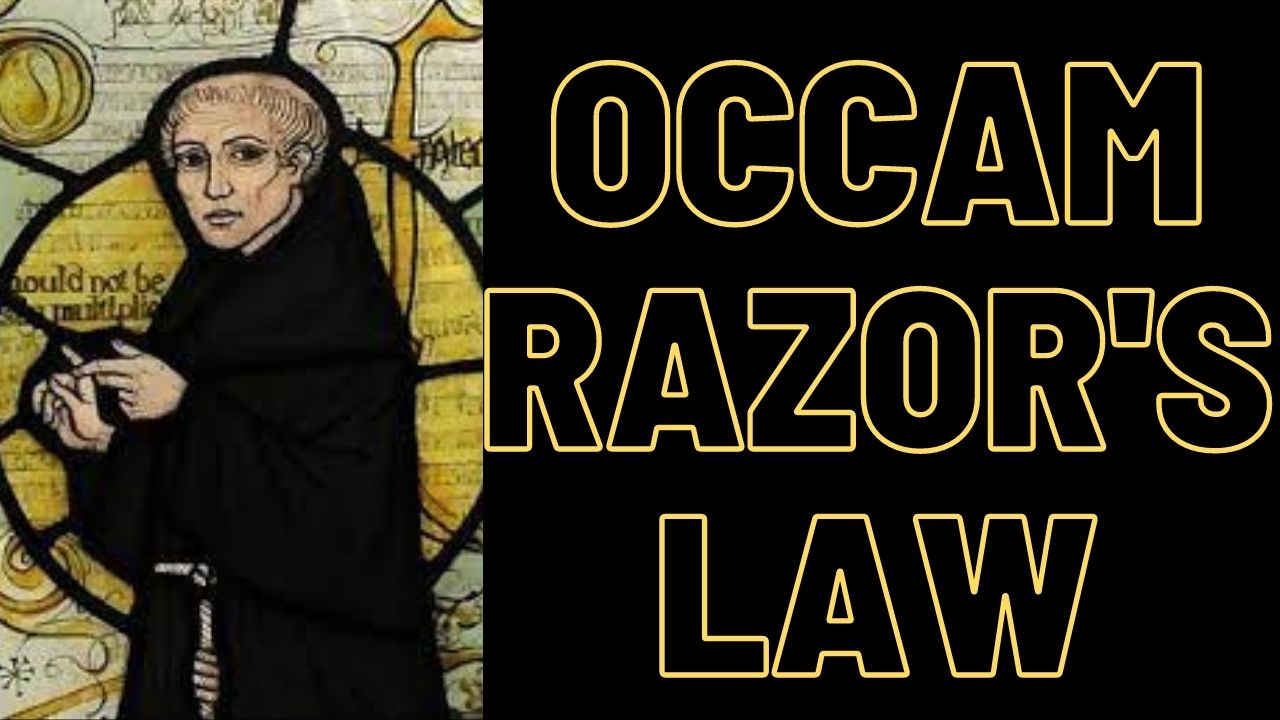What is Occam’s razor law?
Occam’s razor law was stated by philosopher William of Ockham. It is also known as the law of economy or the law of parsimony.
The law says that, “pluralitas non est ponenda sine necessitate” meaning that ‘plurality should not be posited without necessity.”
The principle gives precedence to simplicity. If there are two competing theories then the theory with simpler explanation is to be preferred. The principle is also expressed as “entities are not to be multiplied beyond necessity.”
Why is it called occam’s razor?
The principle was, in fact, invoked before Ockham by durandus of saint-pourçain. A French Dominican theologian and philosopher of dubious orthodoxy, who used it to explain that abstraction is the apprehension of some real entity, such as an Aristotelian cognitive species, an active intellect, or a disposition, all of which he spurned as unnecessary.
Ockham, however, mentioned the principle so frequently and employed it so sharply that it was called “Occam’s razor” (also spelled Ockham’s razor). He used, to dispense with relations, which he held to be nothing distinct from their foundation in things; with efficient causality, which he tended to view merely as regular succession; motion, which is merely the reappearance of a thing in a different place; psychological powers distinct for each mode of sense; and the presence of ideas in the mind of the creator, which are merely the creatures themselves.
This explanation by occam is indeed simple, yet fascinating.
Occam’s razor law and science
It’s interesting to note how this philosophical law has been used by various scientists over the ages. Let’s understand occam’s relationship with science.
Many scientists have adopted or reinvented Occam’s razor, as in Leibniz’s “identity of observables”. Isaac newton stated the rule: “we are to admit no more causes of natural things than such as are both true and sufficient to explain their appearances. “the most useful statement of the principle for scientists is “when you have two competing theories that make exactly same predictions, the simpler one is the better.”
In physics Razor law is used to shave away metaphysical concepts. The canonical example is einstein’s theory of special relativity compared with Lorentz’s theory. That ruler’s contract and clocks slow down when in motion through the ether. Einstein’s equations for transforming space-time are the same as Lorentz’s equations for transforming rulers and clocks, but Einstein and Poincar recognized that the ether could not be detected according to the equations of Lorentz and maxwell. By Occam’s razor, t had to be eliminated.
The principle has also been used to justify uncertainty in quantum mechanics. Heisenberg deduced his uncertainty principle from the quantum nature of light and the effect of measurement.
Stephen Hawking writes in a brief history of time:
“We could still imagine that there is a set of laws that determines events completely for some supernatural being, who could observe the present state of the universe without disturbing it. However, such models of the universe are not of much interest to us mortals. It seems better to employ the principle known as Occam’s razor and cut out all the features of the theory that cannot be observed.”
But uncertainty and the non-existence of the ether cannot be deduced from occam’s razor alone. It can separate two theories that make the same predictions, but does not rule out other theories that might make a different prediction. Empirical evidence is also required, and occam himself argued for empiricism, not against it.
So, should we all just use razor’s law to simplify all our problems?
Einstein has the answer to this question.
Ernst Mach advocated a version of Occam’s razor which he called the principle of economy, stating that “scientists must use the simplest means of arriving at their results and exclude everything not perceived by the senses.” taken to its logical conclusion, this philosophy becomes positivism; the belief that there is no difference between something that exists but is not observable and something that doesn’t exist at all. Mach influenced einstein when he argued that space and time are not absolute but he also applied positivism to molecules.
Mach and his followers claimed that molecules were metaphysical because they were too small to detect directly. This was despite the success the molecular theory had in explaining chemical reactions and thermodynamics. It is ironic that while applying the principle of the economy to throw out the concept of the ether and an absolute rest frame. Einstein published almost simultaneously a paper on Brownian motion which confirmed the reality of molecules and thus dealt a blow against the use of positivism. The moral of this story is that Occam’s razor should not be wielded blindly. As Einstein put it in his autobiographical notes:
“This is an interesting example of the fact that even scholars of audacious spirit and fine instinct can be obstructed in the interpretation of facts by philosophical prejudices.”
The law of parsimony is no substitute for insight, logic, and the scientific method. It should never be relied upon to make or defend a conclusion. As arbiters of correctness, only logical consistency, and empirical evidence are absolute.
If you enjoyed this article, share it with your friends and colleagues! Also, do let us know how you felt in the comment section below.




